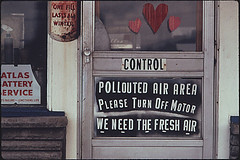3Imebe Third International Meeting on Environmental Biotechnology and Engineering (3IMEBE)
Publicado por
NicoNaiko
Menéalo!
Comparte!
agua,
aguas residuales,
ambiental,
Congresos,
Ingeniería Química,
Investigación,
otras,
Universidades
 Image by pingnews.com via Flickr
Image by pingnews.com via Flickr
Third International Meeting on Environmental Biotechnology and Engineering (3IMEBE)
(3IMEBE)
Palma de Mallorca, SPAIN,
21-25 september 2008
Ver la página web del congreso. (Click aquí)

Terrestrial and aquatic ecosystems are affected by the interaction of factors from natural or anthropogenic origin. Both of them have direct or indirect impact on the environment causing deterioration of soil and water which are fundamental matrices for the vital cycles of the ecosystems and therefore, the earth’s general equilibrium. To counteract this damage, a series of strategies must be defined to protect and remediate the terrestrial and aquatic systems. These strategies should focus on microbial ecology by promoting vital reactions of the ecosystems’ matrices (soil, sediments, water).
The congress intends to translate fundamental knowledge on the microbial ecology of impaired ecosystems into technological solutions for the restoration of terrestrial and aquatic environments. The unification of fundamental and applied research is of utmost importance because they are interdependent and connected to the action-reaction of the environment.
OBJECTIVE
Then the main objective of the congress will be to integrate the different technology oriented research (engineering, biotechnology) in such a way that their future action will be based on fundamental research (ecology).
The action on the environment must be interactive with the participation of different disciplines having common objectives:
- One of the common objectives must be to preserve energy resources and create renewable ones.
- Other common objective must be the re-use of waste which should be valorized and not seen any more as waste but better as “new resources”.
- Finally, the last but not the least common objective must be to minimize pollution and discharge to the environment in order to protect its ecology.
All this will be achieved only with the development of cleaner and cheaper technologies both on an environmental and an energy point of view as well as with an adequate environmental education and a sustainable development.
Organized by:
Institut de Recerca i Formació Agrària i Pesquera de les Illes Balears
Institut de Biologia Animal de Balears
Universidad Autónoma de Madrid
Universitat de les Illes Balears
TOPICS
I. Risk assessment and environmental impact
- Land degradation processes (soil pollution, erosion & salinization)
- Pollution of the Aquatic ecosystems (water column, sediments & eutrophication)
- Air Pollution (Mobile, fixed industrial & Landfill sources)
- Global climate change, C and N cycling
- Domestic & industrial wastewater
- Municipal, animal, agro-food and hazardous wastes
- Sewage sludge
- Treatment technologies
- Physicochemical & membrane processes
- Aerobic & anaerobic processes, wetlands
- Integration of biological & physicochemical processes
- Nutrient removal (N and P)
- Emerging pollutants (endocrine disruptors, micropollutants, etc)
- Agronomic valorization
III. Strategies for the protection and remediation of natural environments
- Soil & aquatic environments including sediments
- Appropriate remediation technologies
- Phytoremediation, bioremediation, bioaugmentation, biowaste addition, Electrokinetics, other techniques
- Ecological processes and biocontrol
- Sustainable agriculture
- Control and modelling of environmental processes
IV. Microbial ecology and molecular biology applications for a better environmental control
- Ecology of the natural and man made environments
- Interactions between microorganisms
- Interactions between microorganisms and plants
- Functional and structural diversity of bacteria
- Environmental enzymes
V. Environmental education and legislative aspect
- Ecosystems and education
- Way of life and sustainable environment
- Health risks
- Legislative aspect for environmental protection
- Water & organic waste treatment
- Soil conservation
VI. New perpectives
- Renewable energy production from waste & wastewater
- High value products from wastes other than biofuels
- Agriculture & forest management for a better control of greenhouse gases
- Technology needs in the developing world
- Etc
----------------
Now playing: John Petrucci - Damage Control (Live Album Version)
via FoxyTunes
![Reblog this post [with Zemanta]](http://img.zemanta.com/reblog_e.png?x-id=f31f3ae5-90b8-4a18-a688-df42a0cc692a)









